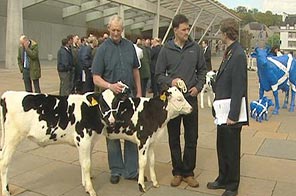Dairy farmers bring Brussels to standstill
BRUSSELS: Farmers on slow-moving tractors brought traffic in Brussels to a standstill on Monday as EU agriculture ministers discussed their demands for more generous EU support for dairy prices.
Some 200 tractors, honking their horns, snaked their way to the European quarter to join 1,500 protesters, police said, with some of the farmers hurling eggs and chestnuts at EU buildings to vent their anger.
Riot police manned barbed-wire barricades and a police helicopter hovered overhead. There were no clashes, although Flemish television reported scuffles with police outside the capital.
European dairy farmers are threatening to resume a strike if Monday's extraordinary meeting of EU farm ministers -- convened by the Swedish EU presidency -- fails to offer them direct aid.
Going into the meeting, Swedish farming minister Eskil Erlandsson told reporters: "I stick to the 'health check' because I want more market liberalisation of the milk sector."
The so-called health check is a November 2008 agreement aimed at modernising the Common Agricultural Policy, which calls for milk quotas to be gradually increased leading up to their abolition in 2015.
Farmers blame market liberalisation for a collapse in dairy prices, with one banner reading "Ultra-liberalism equals the death of agriculture."
According to the European Milk Board, producers are paid "between 18 and 24 cents per kilo, which approximates to half of production costs and therefore half the price required."
Twenty of the 27 EU member states say they back efforts led by Paris and Berlin to inflate prices for milk, butter, powdered milk and cheeses.
But Erlandsson recalled that the European Commission -- which enforces EU farm policy -- has already mandated experts to probe the money-chain between farmers and consumers.
The head of the Copa-Cogeca European farmers' federation, Ireland's Padraig Walshe, warned that "EU farmers are furious."
"Fourteen billion euros (20.5 billion dollars) of their income is being re-distributed amongst other stakeholders in the food chain, especially retailers," he said.
"EU farm ministers must take rapid political decisions to help bring the EU dairy sector out of crisis. Without radical action, more farmers will go out of business and there will be a further exodus from rural areas."
Dairy prices have plummeted since 2007, with only limited aid offered by Brussels to farmers -- and EU Agriculture Commissioner Mariann Fischer Boel said fresh aid would have to come from member states.
"We agreed in 2003 that quotas should go by 2015 and this position still stands," she said. "The discussion will be about what can be done to ensure that there is an economically viable agricultural dairy production in Europe."
Solutions regarding prices at which "farmers can survive, make money (and) invest in the future" are being explored by the experts, she said.
"I'd be happy if member states would give me another five billion (euros) for the dairy sector but that requires also that the German government is ready to pay," she said.
Germany is the biggest single contributor to the EU budget.
"I'm not sure the finance ministers are exactly of the same opinion," she added. "Five billion is equal to the support we give today to increase the price by 3.5 cents per litre."
French farm minister Bruno Le Maire said 20 EU member states were agreed that new market regulation was required.
Italy joined previous backers Austria, Belgium, Bulgaria, the Czech Republic, Estonia, Finland, France, Germany, Hungary, Ireland, Latvia, Lithuania, Luxembourg, Poland, Portugal, Romania, Slovakia, Slovenia and Spain.
That number is enough to overcome qualified majority voting hurdles, added Belgian agriculture minister Sabine Laruelle.
Nevertheless, there was no concerted call for the retention of quotas. Junior German agriculture minister Gert Lindemann called for "accompanying measures" in the run-up to their disappearance.






